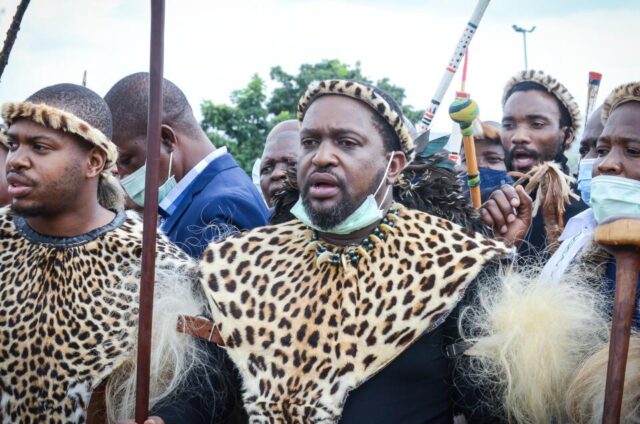King Misuzulu said the artefacts included King Cetshwayo’s barbed headed assegai, Zulu war shields and other weapons that the Zulu impi used during these wars. The king said these items, including King Cetshwayo’s headgear, are displayed at the Wales Military Museum.
DURBAN – King Misuzulu has called on Britain to return Zulu artefacts that were confiscated by British warriors during the Battle of Isandlwana and the Battle of Ulundi in KwaZulu-Natal in 1879.
The king raised the issue when he met the British High Commissioner to South Africa, Anthony Phillipson, on Monday in Gauteng. The meeting focused on business investment for the Zulu kingdom.
The king raised the issue and called for a discussion between the Zulu Royal Family and the British Royal Family to ensure the return of colonial-era artefacts that were “stolen” after the battles.
The king said the artefacts included King Cetshwayo’s assegai, war shields and other weapons the Zulu impi used. The king said these items, including King Cetshwayo’s headgear, were displayed at the Wales Military Museum.
“Returning these will help close a sad chapter, promote-people-to-people contact and harness the co-operation of business in private-public partnerships for nation-building,” said the king.
Angered by the humiliating defeat by the Zulu warriors under King Cetshwayo at the foot of Isandlwana hill outside Nquthu in the west of Ulundi in January 1879, the British sent in heavy artillery and raided King Cetshwayo’s Ulundi palace in retaliation in July same year.
The Zulus put up a little resistance but were immediately defeated by the heavily armed English, who captured the king and took him to St Helena, now known as Robben Island, in Cape Town.
King Misuzulu said Zulu warriors, led by the late King Zwelithini, in 2017 attended the 135th King Cetshwayo Celebrations in Cardiff, Wales. The Zulu warriors were accompanied by the cast and the Zulu Royal Choir and participated in the re-enactment of the Battle of Isandlwana.
The king further said the participation of the Zulu warriors in the King Cetshwayo Celebrations strengthened cultural ties between the people of KwaZulu-Natal and the UK.
This was preceded by the hosting of King Charles III, then the Prince of Wales, and Camilla, then Duchess of Cornwall, by the late King Zwelithini in 2011.
In welcoming them, King Misuzulu said his late father expressed his appreciation on behalf of the people of KwaZulu-Natal for the continued visits of historians and ordinary people from the UK to the annual re-enactment of the Battle of Isandlwana.
He said that over the years it has grown to be more than just a re-enactment of a battle but a celebration of diversity and contributor of tourism revenue to the province. His Majesty expressed his firm support of the government’s plans aimed at increasing the number of tourists from the UK, who attend the commemoration of the battle.
He also hailed the direct flights from Britain to Durban, which started in 2018. The flights leave from the two biggest airports, London and Heathrow, and land at Durban’s King Shaka International Airport.
The king pushed for rural economic development and attraction of investments to the Zulu kingdom.
The king said his engagement with the British High Commissioner has paved the way for more engagements which would focus on ensuring partnerships of mutual benefits between the people of Britain and the people of KwaZulu-Natal.
Furthermore, he announced that the Commissioner would visit the Zulu Kingdom on a date to be announced to explore partnerships on the following focus areas:
1. Investments in education, health and social infrastructure;
2. Stimulation of agriculture to ensure food security and creation of jobs;
3. Resuscitating of tourism sector;
4. Ensuring the entry of indigenous people into key sectors of the economy;
5. Exchange Programmes for the development of indigenous people;
6. Focus on arts, culture and heritage.








